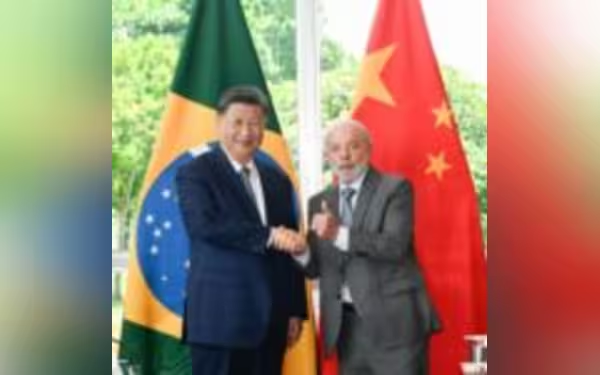Monday, November 25, 2024 10:38 PM
China-Brazil Partnership Strengthens for Sustainable Development
- China and Brazil elevate ties for shared future.
- Belt and Road Initiative aligns with Brazil's development.
- Cooperation in renewable energy and infrastructure expansion.
 Image Credits: pakistantoday
Image Credits: pakistantodayChina and Brazil enhance bilateral ties, focusing on sustainable development and infrastructure modernization through the Belt and Road Initiative.
In a significant diplomatic move, Chinese President Xi Jinping and Brazilian President Luiz Inacio Lula da Silva have announced an elevation of their countries' bilateral ties to a "community with a shared future for a more just world and a more sustainable planet." This announcement was made during Xi's state visit to Brazil, marking a pivotal moment in the relationship between these two major developing nations.
The leaders' commitment to align the China-proposed Belt and Road Initiative (BRI) with Brazil's development strategies is a key aspect of this new partnership. The BRI aims to enhance global trade and development through shared infrastructure, and Brazil's participation is expected to modernize its infrastructure and strengthen regional connectivity.
The warmth of the China-Brazil relationship was evident during a grand welcoming ceremony hosted by President Lula. A Brazilian singer performed the iconic Chinese song "My Motherland" in Chinese, a gesture that reciprocated a similar act from Lula's visit to China last year, where a Brazilian song, "Novo Tempo" or "A New Time," was played. These songs symbolize the deep cultural ties and mutual respect between the two nations.
During their meeting, President Xi expressed his appreciation for the importance Lula places on China-Brazil relations, highlighting the friendship between their peoples. Lula emphasized that China is Brazil's most important strategic partner, showcasing the trust and respect that exists between the two countries.
As Brazil and China celebrate five decades of diplomatic relations, Xi noted the deep ties forged over the years, emphasizing a relationship built on mutual respect, benefit, and cooperation. Brazil holds a unique position in China's global partnerships, being the first country to establish a strategic partnership with China and the first in Latin America to enter into a comprehensive strategic partnership.
According to Julio Bandeira, author of "Brazil en Route to China," the Brazilian people have a long-standing admiration for Chinese culture. He noted that the overseas Chinese community in Brazil has significantly contributed to the country's economy and society.
Central to the discussions between the two leaders was the commitment to align the BRI with Brazil's key development strategies. These strategies focus on modernizing infrastructure and enhancing regional connectivity, which are essential for Brazil's growth. President Xi called for deeper cooperation in various sectors, including economy and trade, finance, science and technology, and environmental protection.
President Lula also highlighted plans to expand cooperation in sustainable development, infrastructure, finance, energy transition, and aerospace. Notably, projects like the Belo Monte UHV transmission project are already underway, creating an "electricity expressway" that links the north and south of Brazil, providing power to millions.
Brazil's rich renewable resources, such as hydroelectric, solar, and wind energy, align well with China's expertise in clean energy technology. Over the years, Chinese companies have actively participated in Brazil's renewable energy sector, contributing to job creation and technological advancements.
The elevation of China-Brazil ties marks a new chapter in their relationship, one that promises mutual benefits and shared growth. As both nations work together to address global challenges, their partnership could serve as a model for cooperation among developing countries, showcasing the power of collaboration in achieving sustainable development and economic progress.













